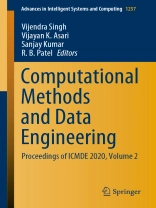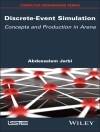This book gathers selected high-quality research papers from the International Conference on Computational Methods and Data Engineering (ICMDE 2020), held at SRM University, Sonipat, Delhi-NCR, India. Focusing on cutting-edge technologies and the most dynamic areas of computational intelligence and data engineering, the respective contributions address topics including collective intelligence, intelligent transportation systems, fuzzy systems, data privacy and security, data mining, data warehousing, big data analytics, cloud computing, natural language processing, swarm intelligence, and speech processing.
Inhoudsopgave
Software Quality Optimization of Coupling and Cohesion Metric for CBSD Model.- Detecting WSN Attacks Through HMAC And SCH Formation.- Literature Review of various nature inspired optimization algorithms used for Digital Watermarking.- Geo-spatial Knowledge Management – Fresh Fuel for Banking and Economic Growth?.- Neural Network and Pixel Position Shuffling Based Digital Image Watermarking.- Hybrid Optimized Image Steganography with Cryptography.- Txt Line Seg: Text Line Segmentation of Unconstrained Printed Text in Devanagari Script.
Over de auteur
Prof. Vijendra Singh is working as Professor in the School of Computer Science and Engineering at The University of Petroleum and Energy Studies, Dehradun, Uttarakhand, India. Prof. Singh received his Ph.D. degree in Engineering and M.Tech. degree in Computer Science and Engineering from Birla Institute of Technology, Mesra, India. He has 20 years of experience in research and teaching including IT industry. Prof. Singh major research concentration has been in the areas of data mining, pattern recognition, image processing, big data, machine learning, and soft computation. He has published more than 65 scientific papers in this domain. He has served as Editor-in-Chief, Special Issue, Procedia Computer Science, Vol 167, 2020, Elsevier; Editor-in-Chief, Special Issue, Procedia Computer Science, Vol 132, 2018, Elsevier; Associate Editor, International Journal of Healthcare Information Systems and Informatics, IGI Global, USA; Guest Editor, Intelligent Data Mining and Machine Learning, International Journal of Healthcare Information Systems and Informatics, IGI Global, USA; Editor-in-Chief, International Journal of Social Computing and Cyber-Physical Systems, Inderscience, UK; Editorial Board Member, International Journal of Multivariate Data Analysis, Inderscience, UK; Editorial Board Member, International Journal of Information and Decision Sciences, Inderscience, UK.
Prof. Vijayan K. Asari is a Professor in Electrical and Computer Engineering and Ohio Research Scholars Endowed Chair in Wide Area Surveillance at the University of Dayton, Dayton, Ohio. He is the Director of the University of Dayton Vision Lab (Center of Excellence for Computer Vision and Wide Area Surveillance Research). Prof. Asari had been a Professor in Electrical and Computer Engineering at Old Dominion University, Norfolk, Virginia, till January 2010. He was the Founding Director of the Computational Intelligence and Machine Vision Laboratory (ODU Vision Lab) at ODU. Prof. Asari received the bachelor’s degree in Electronics and Communication Engineering from the University of Kerala (College of Engineering, Trivandrum), India, in 1978, the M.Tech. and Ph.D. degrees in Electrical Engineering from the Indian Institute of Technology, Madras, in 1984 and 1994, respectively. Prof. Asari received several teachings, research, advising, and technical leadership awards. Prof. Asari received the Outstanding Teacher Award from the Department of Electrical and Computer Engineering in April 2002 and the Excellence in Teaching Award from the Frank Batten College of Engineering and Technology in April 2004. Prof. Asari has published more than 480 research papers including 80 peer-reviewed journal papers co-authoring with his graduate students and colleagues in the areas of image processing, computer vision, pattern recognition, machine learning, and high-performance digital system architecture design. Prof. Asari has been a Senior Member of the IEEE since 2001 and is a Senior Member of the Society of Photo-Optical Instrumentation Engineers (SPIE). He is a Member of the IEEE Computational Intelligence Society (CIS), IEEE CIS Intelligent Systems Applications Technical Committee, IEEE Computer Society, IEEE Circuits and Systems Society, Association for Computing Machinery (ACM), and American Society for Engineering Education (ASEE).
Prof. Sanjay Kumar is working as Professor in the Computer Science and Engineering Department, SRM University, India. He received his Ph.D. degree in Computer Science and Engineering from Deenbandhu Chhotu Ram University of Science and Technology (DCRUST), Murthal (Sonipat), in 2014. He obtained his B.Tech. and M.Tech. degrees in Computer Science and Engineering in 1999 and 2005, respectively. He has more than 16 years of academic and administrative experience. He has published more than 15 papers in the international and national journals of repute. He has also presented more than 12 papers in the international and national conferences. His current research area is wireless sensor networks, machine learning, Io T, cloud computing, mobile computing and cyber, and network security. He chaired the sessions in many international conferences like IEEE, Springer, and Taylor & Francis. He is the Life Member of Computer Society of India and Indian Society for Technical Education.
Prof. R. B. Patel is working as Professor in the Department of Computer Science and Engineering, Chandigarh College of Engineering and Technology (CCET), Chandigarh, India. Prior to joining the CCET, he worked as Professor at NIT, Uttarakhand, India, and Dean, Faculty of Information Technology and Computer Science, Deenbandhu Chhotu Ram University of Science and Technology, Murthal, India. His research areas include mobile and distributed computing, machine and deep learning, and wireless sensor networks. Prof. Patel has published more than 150 papers in international journals and conference proceedings. He has supervised 16 Ph.D. scholars and currently 02 are in progress.












